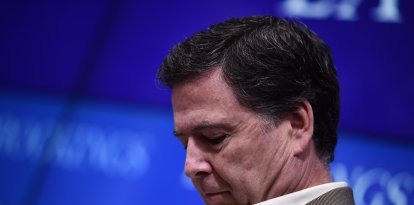Winning the presidential election: A matter of faith
A study by Arizona Christian University concludes that more than 100 million "people of faith" are considering not going to the polls in November.

Donald Trump and Kamala Harris greet each other before the ABC debate.
Victory in the upcoming presidential election in November is lining up to be a matter of faith, this year more than ever. More than 100 million "people of faith" are considering not going to the polls on Tuesday, Nov. 5, which makes this group a priority for the campaigns of Donald Trump, likely the most harmed by a poor turnout from religious voters, and Kamala Harris.
So says a study conducted by the Cultural Research Center at Arizona Christian University, led by Dr. George Barna. The survey also concludes that voter enthusiasm is notably lower than it was before elections in recent years, with turnout forecast to be much lower: 51% are currently expected to go to the polls, compared to about 54% in 2012 (Obama-Romney); 55% in 2016 (Trump-Clinton); and 61% in 2020 (Trump-Biden).
Disinterest in politics, dissatisfaction with candidates and fears of tarnished results
According to their data, more than 104 million believers, 32 million of them Christians who go to church regularly, would not vote in the next election if it were held today. The main reasons are disinterest in politics and dissatisfaction with the candidates of the two major parties, Donald Trump and Kamala Harris, as well as the "widespread expectation that the results of the election will be manipulated by illegal, behind-the-scenes activities and voting by illegal immigrants."
The survey defines "believers" or "people of faith" as "either someone who described themselves as 'a person of religious faith' or as someone who associated with some recognized religious faith (such as Christianity, Judaism, Mormonism, Islam, etc.)." According to the study, "79% of Americans qualified as a person of faith. In total, 66% of Americans 18 or older identified as Christian, thus constituting more than four out of every five adults (83%) who view themselves as a person of faith."
At this time, Dr. Barna's survey indicates that, among these voters, "only one-half (51%) indicated they are likely to vote. If the survey statistics are projected on the basis of national population estimates, based on a Census derived U.S. voting-age population of 268 million and an estimated 212 million adults qualifying as a person of faith, the 49% who are not likely to vote in November represents about 104 million eligible non-voters in the 'people of faith' segment."
65 million Christians will consider not voting in November
In addition, the report also noted the voting intention of each Christian denomination: "Among those are people who are defined by their beliefs regarding sin and salvation as born-again Christians (41 million expected to not vote); self-identified Christians who regularly attend church services (32 million not expected to vote); and voting-age adults who regularly attend an evangelical church (14 million of whom are expected to not vote). The research also indicated 46 million adults who attend Protestant churches and 19 million who attend Catholic churches are not likely to vote."
The causes of this political disaffection are varied: "The most common reason, offered by two-thirds of the non-voters (68%), was a lack of interest in politics and elections. Other common reasons included disliking all of the major candidates (57%), feeling that none of the candidates reflect their most important views (55%), and believing that their one vote will not make a difference (52%). Half of the non-voters said they will avoid voting because the election has become too controversial for their liking (50%). Almost half of the non-voters (48%) were deterred by the belief that the election outcome will be rigged, or by not knowing enough about the candidates to choose one (48%)," Barna noted.
A key vote for the election of a new president
As Barna points out, high turnout from the faithful who are on the fence about going to the polls could trigger an electoral tsunami and decide the next tenant of the White House. Especially considering that, in the last election, the difference between Joe Biden and Trump was only 7 million votes, versus the 104 million theoretically at stake among this group:
"But even that figure is misleading. The voting results that tell the real story are the margins of victory in the swing states. In 2020, the margins of victory were a combined 587,000 votes or so in nine battleground states, Cumulatively, they represented about one-fifth of the Electoral College votes—104 out of the 538 electoral votes. You only need 270 electoral votes to win the race, yet an average gap of just 60,000 votes in each of those states determined the winner of nearly 40 percent of the total electoral votes needed to win."
The importance of Nov. 5 for Christians
The study's author stressed that, "In that context, the 32 million Christians sitting in the pews each week who refuse to vote are a gamechanger. It’s low hanging fruit for pastors as they try to motivate those congregants to carry out their civic duty and honor God through their influence for things that matter in our culture." Barna was hopeful that more Christians will be encouraged about the election in the final month of the cycle.
"If church leaders, family members, and close friends will use their influence to get reticent voters from their churches to cast a ballot on November 5, the election outcome will be meaningfully affected. What a great way for believers and churches to use their platform—not by replacing their 8 spiritual mandate with political emphasis, but by teaching people to live a culturally engaged life based on biblical principles. That, of course, includes voting. And it’s not only voting for the next president, but also determining who will hold many other federal, state and local offices, and what will happen with numerous referenda," he said.
Barna himself notes in the conclusion of the study that "In a society where a huge majority of people want their lives to make a difference, and millions of Americans lament the lack of options for making their life count, what a sterling opportunity November 5 represents."

























